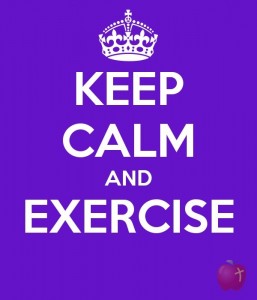(To jump ahead to Saturday’s Christmas Passage, click “Keep Reading This Article.”)

For full study details see: Effects of Emotional Exposure on State Anxiety after Acute Exercise.
A new study suggests that the stress-fighting benefits of exercise may also ward off post-workout anxiety. As corresponding study author, J. Carson Smith, Ph.D. (Department of Kinesiology, University of Maryland), explains:
“The effect of a single session of exercise to improve mood and reduce symptoms of anxiety in healthy non-anxious adults has been well established. […] A key unanswered question is whether acute exercise confers short-term protection, after its cessation, against typically experienced psychological stressors or emotional provocation.”
Smith’s research, published ahead of print in Medicine and Science in Sports and Exercise (August 2012), aimed to compare the effects of moderate intensity exercise to a seated rest control condition on state anxiety symptoms[1. State anxiety refers to feelings of anxiousness you may feel after a certain event; trait anxiety refers to more persistent feelings of anxiousness that are basically ingrained in your personality.] after exposure to a variety of emotionally arousing stimuli. Participants completed two conditions: seated quiet rest[2. You know that calm feeling you have after a good workout? Researchers have often compared it to a “quiet rest period” – where your mind is relaxed and your anxiety levels are low. Wondering if quiet rest is actually the same thing as post-workout relaxation, scientists modified exercise and rest conditions (by manipulating body temperature and caffeine ingestion). As it turns out, the anxiolytic effects of exercise conditions stayed the same, while those of the rest conditions changed – meaning that there is something different about your post-workout calm (versus relaxing for a quiet period of rest) that helps fight off anxiety.] and moderate intensity cycling exercise, and afterward viewed emotional pictures. Their state anxiety scores (measured before and after each condition, and after picture viewing) were then compared. The result?
State anxiety was reduced after 30 minutes of moderate intensity exercise and remained reduced after viewing of emotionally arousing stimuli; the anxiolytic (anxiety-reducing) effect of quiet rest did not persist, but rather, returned to baseline after viewing the stimuli. These results led Smith to conclude:
“There is evidence to support the hypothesis that exercise may promote a persistence of post-exercise anxiety reduction and a resiliency to perturbation by emotional stressors.”
So next time you find yourself procrastinating, schedule the most stressful events of your day after your workout – you might be able to handle them a little bit more calmly than you thought!
References:
Smith, Carson J. Effects of Emotional Exposure on State Anxiety after Acute Exercise, Medicine and Science in Sports and Exercise, Published ahead of print – August 2012, DOI: 10.1249/MSS.0b013e31826d5ce5. Retrieved: 14 December 2012.
——————–

Luke 1:28 – 33:
And having come in, the angel said to her, “Rejoice, highly favored one, the Lord is with you; blessed are you among women!”
But when she saw him, she was troubled at his saying, and considered what manner of greeting this was.
Then the angel said to her, “Do not be afraid, Mary, for you have found favor with God.
“And behold, you will conceive in your womb and bring forth a Son, and shall call His name Jesus.
“He will be great, and will be called the Son of the Highest; and the Lord God will give Him the throne of His father David.
“And He will reign over the house of Jacob forever, and of His kingdom there will be no end.”


Leave a Reply